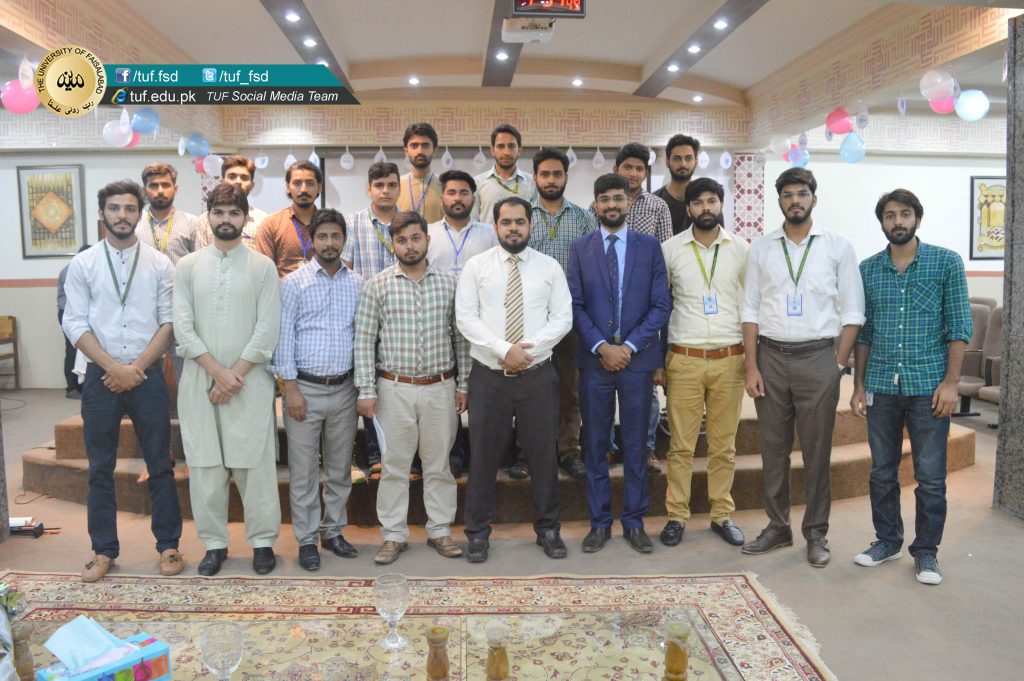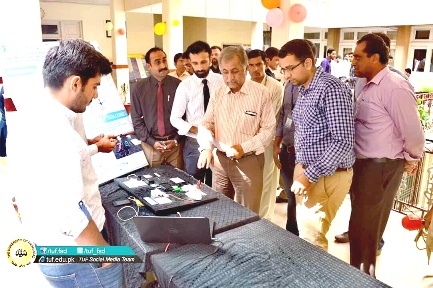
OBJECTIVES
1. The graduates of the PhD Electrical Engineering program will possess a strong technical background as well as analytical, critical-thinking, and problem-solving skills that enable them to excel as professionals contributing to a variety of engineering roles within the various fields of electrical engineering and the high-tech industry.
2. The graduates of the PhD Electrical Engineering program are expected to be employed in electrical engineering positions including (but not limited to) design engineers, test engineers, characterization engineers, applications engineers, field engineers, hardware engineers, process engineers, control engineers, and power engineers, Research and development departments in universities as well as industries.
3. The graduates of the PhD Electrical Engineering program will be committed to professional development and lifelong learning by engaging in professional or graduate education in order to stay current in their field and achieve continued professional growth.
4. The graduates of the PhD Electrical Engineering program will be working as effective team members possessing excellent oral and written communication skills, and assuming technical and managerial leadership roles throughout their career.
Career Scope and Opportunities
Electrical Engineering being one of the core fields of engineering is always evergreen in terms of scope and job prospects. Electricity has become the basic need for survival, globally.
As such, electrical engineers find their utility in maintenance and running of industrial plants, communication and satellite navigation systems and domestic electronic equipment. Electrical Engineering equips the learner with the knowledge of electrical circuit design, digital electronics, instrumentation and control system, modern telecommunication and signal processing.
The PhD Electrical Engineering program provides the graduates with the broad as well as in-depth technical education necessary for productive employment in the public or private sector. It is designed towards development of understanding of advanced issues important for current and future needs of the region. The PhD Electrical Engineering program at The University of Faisalabad also offers an understanding of the breadth of education and depth of training necessary for leadership in this profession.
Aptitude test
NTS-GAT (Subject Test). Result has to be submitted at the time of admission.
The program structure for the PhD is as follows.
| S No. | Activity | Credits |
|---|---|---|
| 1. | Course work | 18 |
| 2. | Thesis | 6 |
| Total | 24 |
Semester 1
| Course Code | Subject | Credit |
|---|---|---|
| EE-801 | Research Methods in PhD Studies | 3 |
| Elective-I | 3 | |
| Elective-II | 3 | |
| Total credit hours for the 1st semester | 9 |
Semester 2
| Course Code | Subject | Credit |
|---|---|---|
| Elective-III | 3 | |
| Elective-IV | 3 | |
| Elective-V | 3 | |
| Total credit hours for the 2nd semester | 9 |
Semester 3 - 6
| Course Code | Subject | Credits |
|---|---|---|
| EE-902 | Supervised Research (PhD Thesis) including defense and acceptance of research proposal | 6 |
| Credit Hours | 6 | |
| Total Credit hours for PhD Program | 24 |
PhD List of Courses
| Course Code | Course Title | Credit Hours |
|---|---|---|
| EE-710 | MOS VLSI Circuit Design | 3(3-0) |
| EE-711 | Real Time DSP Design and Applications | 3(3-0) |
| EE-712 | Advanced Digital Communications | 3(3-0) |
| EE-801 | Research Methods in PhD Studies | 3(3-0) |
| EE-802 | Power management in wired and wireless systems | 3(3-0) |
| EE-803 | Low Power System Design | 3(3-0) |
| EE-804 | Advance System Modeling and Simulation | 3(3-0) |
| EE-807 | Special Topics in distributed systems | 3(3-0) |
| EE-808 | Power awareness in distributed systems | 3(3-0) |
| EE-813 | Power System Stability and Dynamics | 3(3-0) |
| EE-814 | Power System Transients | 3(3-0) |
| EE-815 | HVDC and Flexible AC Transmission | 3(3-0) |
| EE-816 | Rural Electrification and Distributed Generation | 3(3-0) |
| EE-817 | Artificial Intelligence techniques in Power systems | 3(3-0) |
| EE-818 | Power System Deregulation | 3(3-0) |
| EE-819 | Advanced Computer Architecture | 3(3-0) |
| EE-820 | Advanced Embedded Systems | 3(3-0) |
| EE-821 | Advanced Digital Signal Processing | 3(3-0) |
| EE-822 | Advanced Digital System Design | 3(3-0) |
| EE-823 | ASIC Design Methodology | 3(3-0) |
| SE-805 | Power Aware Computing | 3(3-0) |
| SE-809 | Advanced Artificial Intelligence | 3(3-0) |
| SE-810 | Advanced Neural Networks | 3(3-0) |
| SE-811 | Data Ware housing and Mining | 3(3-0) |
| SE-812 | Machine Learning | 3(3-0) |
| SE-710 | Formal Methods and Specifications | 3(3-0) |
| SE-719 | Human Aspects in Software Engineering | 3(3-0) |
| MAT-853 | Advanced Engineering Mathematics | 3(3-0) |
| *MGT-801 | Logic and Research | 3(3-0) |
| *MGT-802 | Advanced Qualitative Research Methods | 3(3-0) |
| *MGT-806 | Advanced Quantitative Research Methods | 3(3-0) |
| *MGT-803 | Critical Review of Literature | 3(3-0) |
| CS-750 | Computer Vision | 3(3-0) |
| CS-715 | Pattern Recognition | 3(3-0) |
| CS-815 | Agent-Based Modeling | 3(3-0) |
| CS-816 | Bio Medical Image Analysis | 3(3-0) |
* Only one course may be allowed with the approval of Office of Postgraduate Studies.
No FAQs available for this course.
BS-Speech and Language Pathology
ADP Speech Language and Pathology
ADP HUMAN NUTRITION AND DIETETICS
MS MEDICAL LABORATORY SCIENCES
PHD URDU
MPHIL URDU


